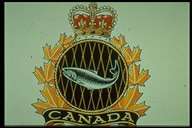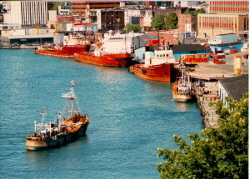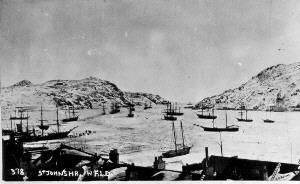
The prolific fishing grounds around Newfoundland have been used by large numbers of European fishermen ever since the fifteenth century and we know how important it is to them even today. In the seventeenth and eighteenth centuries, the countries of Western Europe considered Newfoundland to be even more important than they do now, and the fishery caused a continuous struggle between the nations who came here. Today Newfoundland is a remote and underdeveloped part of Canada, lying on the outer fringes of communications for that country; before 1800 Newfoundland lay in the centre of communications between Northern Europe and the New World. She was regarded as one of the most important colonial possessions of Great Britain. Both France and England placed great importance upon the fishery and more than once it was at least partly responsible for European wars. When war broke out in 1689, for example, the English presented a list of reasons for fighting the French, and second on that list was a claim that the French were encroaching upon the English fishery here. In the seventeenth century English statesmen thought Newfoundland to be much more important than New England. After 1763 when Canada was added to the British Empire, the government thought Newfoundland and the newly ceded St. Lawrence Gulf fisheries to be much more important than the vast but underdeveloped mainland.
Merchants, fishermen and statesmen continually talked of the value of the Newfoundland fishery and made often extravagant claims for it. In 1713, for example, some French merchants said it was "absolutely necessary for the support of the Kingdom in general and more particularly for the Maritime Provinces of Western France where thousands of families would be reduced to beggary in case that fishery be taken from them," while in 1784 an English politician proclaimed that the fishery "was a more inexhaustible and infinitely more valuable source of wealth than all the mines in the world."
These two quotations merely represent hundreds of others, for men talked a lot about the valuable fisheries.
Of course, many of these claims were extravagant, made by men directly involved in the fishery, but it remains true that Newfoundland played a prominent role in the thoughts of statesmen and admirals as well as those of merchants and fishermen. Why was she thought so important?
Contemporaries gave six reasons.

Consumption of Newfoundland dried cod was confined almost entirely to the nations of France, Spain, Portugal, and Italy. England and Ireland obtained more fish than they needed from their own home waters while Scandinavia and Northern Europe - what are now the countries of Germany, Holland, Belgium and Eastern France - consumed fish from the North Sea and Iceland. However, the people living in Spain and Portugal (Iberia) and much of France and Italy lacked rich fishing grounds close to home and, with the exception of France, were also deficient in meat production. Hence Newfoundland cod was vital for them and, as a seventeenth century Englishman put it, "without Newfoundland cod Spain and Portugal could hardly live." From 1670 onwards the French were able to supply their own markets with Newfoundland fish, and also to sell a certain amount in the other countries, but England, having no market for the fish herself, depended entirely upon demand in Spain, Portugal and Italy. For this reason she fought hard and successfully after 1600 to prevent those nations from coming to Newfoundland to catch their own fish. Especially after 1775, the West Indies and Brazil became important markets for Newfoundland cod. During the nineteenth century, Newfoundland monopoly in Southern Europe was broken by competition from Norway and others, but for the period with which we are concerned, ninety-five percent of English Newfoundland fish sold in Southern Europe where it was unchallenged either in quality or price.
As a source of employment for fishermen and seaman, the fishery was vital to certain parts of Western Europe which faced outwards into the Atlantic and thus were best suited for rapid travel to Newfoundland.
The Portuguese fishery, while it flourished in the sixteenth century, was carried on mainly from Northern Portugal and was centred on the ports of Aveiro, Viana and Oporto, while the Spanish fishery, which also declined after 1600, was similarly concentrated in Northern or Biscayan Spain in the province of Guipizcoa at the great port of Bilboa. The French fishery was carried on from Normandy, Brittany and Gascony, the provinces of Northwest and Western France, while that of England was almost completely confined to what we call the Southwestern Peninsula, which runs from the county of Hampshire through Dorset, Devonshire and Cornwall around the coast until one reaches the city of Bristol.
Of course all of these regions carried on other activities besides the Newfoundland trade. Gascony in France or Oporto in Portugal, for example, had thriving wine industries, while Brittany and Normandy in France and Cornwall in England, had important inshore fisheries. Cornwall had an important mining industry, and Devonshire very extensive woolen and cloth manufacturers. Bristol was the centre of a great number of maritime trades of which Newfoundland was a comparatively small one. Nevertheless, many towns depended almost completely upon the fortunes of Newfoundland. Dartmouth and Poole in England are extremely good examples, and the villages around the Western European seaports were all dependent to some degree upon the fishery, either by growing food, manufacturing commodities or sending their men to fish. It is not easy to find out exactly how many men came fishing from Europe but in 1678, for example, the French were said to employ three hundred ships and twenty thousand men. A hundred years later the English regularly had twenty thousand men here during the summer season, including of course many from Southern Ireland. It is even more difficult to estimate how many other men obtained at least part of their living by the sale of provisions and manufactures to the fishery, although John Mason in 1620 said that they numbered twenty thousand in England alone. Certainly all these men, ships and boats consumed vast amounts of food and equipment. We know that sail and ropemakers, shipwrights, blacksmiths, leatherworkers, brewers and especially clothmakers in parts of Western England and Western France were very heavily dependent upon the fortunes of the fishery. If it failed, they too would be harmed. When one considers that both the Newfoundland fishermen and the workers who supplied them supported wives, children and other kinfolk, it is not surprising that the fishery was considered indispensable to the prosperity of the regions from which it was carried on, and that governments took steps to preserve and promote their Newfoundland fisheries.
For France, but even more for England, the earnings of foreign exchange which came from selling Newfoundland fish in other countries formed a useful element in the balance which was greatly lauded by contemporaries. In 1630, for example, William Hayman, the Governor of Harbour Grace, claimed that "the fishery had brought forth from Spain silver and gold more cheaply than the Spaniards have had it from their Indies." This is rather an exaggeration, but it is true that the sale of Newfoundland cod to Spain, Portugal and Italy did enable England to purchase many commodities which she needed but could not produce herself - nuts, wine, iron ore and fruit, cotton wool and oils - which were greatly desired in England. It also brought in gold and silver, which contemporaries believed strengthened the power of England while weakening that of the countries from which it was obtained. Goods bought from the proceeds of Newfoundland fish also paid import duties when they were imported into France or England and thus the royal treasuries were directly helped. Of course, these duties formed only a small proportion of the revenue of the crown, but in those days governments were always short of money and every little bit helped.

These advantages alone would have made governments aware of the necessity to protect and promote their fisheries, but for England and France the government was above all conscious of the value of the fishery as a training ground for seamen. As an eighteenth century English statesman put it, "the Newfoundland fisheries were one great nursery of our seamen and a principal basis of the maritime power of England." Both England and France stressed the development of powerful navies to protect colonies and trade, the defend their homelands, and to threaten that of the enemy. However, the poverty of national treasuries meant that in peace time both nations drastically reduced their naval strength, discharging their seamen and laying up their warships. Thus when war broke out, men had to be found quickly and in large numbers to man the fighting navy. Soldiers could be trained in six weeks but the complex fighting ships needed crews who, if they were not all expert in gunnery or naval discipline, were at least expert seamen used to service in hard deep-sea voyages. The Newfoundland fishery was one of the best sources of supply for such men and probably formed the backbone of manpower recruitment into the French navy. For the English it was not quite so important because of her huge coal and coastal trades and her inshore fishery, but it was still important. For both it trained some of the best seamen to be found, for it had certain unique characteristics. Unlike the coastal shipping, men who served in the navy acquired experience of long and dangerous deep-sea voyages and unlike other deep-sea trades such as those to the West or East Indies, the Newfoundland trade was thought very healthy; "scarce one man in fifty dying whilst on the fishery," whereas in the West Indies fevers killed men in enormous numbers. Even more, a fishing ship carried far more men than did an ordinary merchant vessel. The merchant man carried only a crew sufficient to navigate her; a fishing ship had to take a large extra complement of hands needed to man the fishing boats during the season. Probably this feeling that the fishery was valuable as a training ground for mariners was the greatest single factor in influencing the British and French governments to lay so much stress upon the value of Newfoundland.

In practise, however, the objective of making Newfoundland as much as possible a recruiting ground for the navies tended to conflict with the other benefits which accrued from the fishery. Governments might value the fishery as a naval reserve, but the merchants, seamen and fishermen valued it as a source of employment. They often used the slogan of the nursery of seamen to pressure governments into helping them, but when war broke out, they tried as hard as they could to avoid the fighting navies. Neither the English nor the French fishermen were ever keen to join the King's Navy for the pay was poor, discipline harsh, living conditions terrible and the danger of death, or even worse of maiming and a discharge without a pension, was considerable. The fishery was their livelihood and when war broke out they did not want this to be interrupted; they tried to evade the Press Gangs. The merchants too hated to see their men pressed into the navy for if they lost their skilled fishermen, they could not carry on the fishery. The merchants would be ruined and they fishery would collapse. But if the fishery collapsed, the government would lose its nursery of seamen. The French merchants and fishermen, especially after 1713, could not avoid the Press Gangs, for the French governments stopped all ships sailing to the fishery immediately upon the outbreak of war and took all the men into the navy. The English, however, could come over to Newfoundland and avoid the Press. Increasingly, the English government relaxed its attempts to press Newfoundland fishermen because it realised they were vital to the prosperity of the fishery. If the fishery failed, there would not be a nursery of seamen. But what use as a nursery of seamen if the seamen trained up could not be used in the Royal Navy? The dilemma was never really resolved. Thus the French did enforce the draft of their fishermen into the navy as soon as war broke out. This undoubtedly gave them a short-term advantage since it filled the French warship with skilled seamen at a time when the English had to make do with landsmen. However, by the mid-eighteenth century, the French fishery was in serious decline, largely because it kept being interrupted by the French government's demands for men. The English, on the other hand, carried on the fishery through both war and peace. Although at first they may have obtained less skilled men for the navy, in the long run they probably trained many more, since the fishery continued to train green men even while the wars raged.
The English government faced a problem which the French, at least after 1713, did not. To avoid the Press Gangs, men fled to Newfoundland. This caused an increase in the resident population and threatened to weaken the migratory fishery which was the real nursery of seamen. The government tried to discourage settlement, but this made the merchants and fishermen determined to continue it as was the only means of assuring that the fishery could continue during wartime.
You will have noticed that when we talk of the way in which Newfoundland was valued in Western Europe, we talk of the fishery rather than the Island itself. However, both the English and French slowly came to realise that occupation of the Island was indispensable to the safe and economic prosecution of the fishery.
